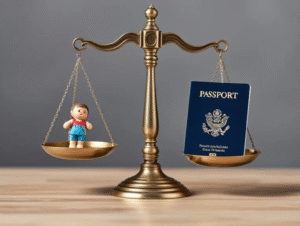If you have read our main guide on Child Arrangements Orders (CAOs), you will already understand what these orders are and why they matter. This article continues from that foundation, offering a step-by-step explanation of how to apply for a CAO in the UK. It is particularly helpful for Asian and international clients who may be unfamiliar with the UK family court system or concerned about cultural and cross-border factors.
Table of Contents
From mandatory mediation to filing applications and attending court hearings, we break down each stage of the process in practical terms. Whether you are seeking to establish contact, secure living arrangements, or address non-compliance with an existing order, understanding the legal process is essential to protecting your child’s best interests and your parental rights, the steps of which are as follows:
1. Mediation as the First Step (MIAM)
Before making a formal court application, parents must attend a Mediation Information and Assessment Meeting (MIAM). This session lasts for about 60 minutes and it allows individuals to discuss their situation, the issues requiring resolution—often related to children or finances—and to learn about the mediation process and alternative dispute resolution options. The mediator will assess whether mediation is appropriate for the case and may refer participants to other support services, such as counselling or co-parenting guidance, where relevant. For cases involving children over 10, the child’s right to be heard will also be considered. Attendance at a MIAM is usually a legal requirement before applying to family court, unless specific exemptions apply, such as in cases involving domestic abuse. While legal aid may cover the cost for eligible clients, private MIAMs typically cost around £120 per person. Only mediators accredited by the Family Mediation Council (FMCA) can sign court forms confirming MIAM attendance.
2. Filing the Application: The C100 Form
Applications are made to the Family Court, and a filing fee of £245 applies, though fee exemptions may be available based on income thresholds.
What Happens at the Family Court?

Once filed, the case progresses to a First Hearing Dispute Resolution Appointment (FHDRA). During this hearing, the parties meet a judge and a Cafcass (Children and Family Court Advisory and Support Service) officer. Cafcass plays a pivotal role in advising the court on what arrangement best serves the child’s interests, often after interviewing both parents and the child.
If no agreement is reached at this stage, the court may list the matter for a fact-finding hearing, request expert reports, or appoint a guardian ad litem (or GAL i.e. a person appointed by a court to represent the best interests of a child GALs can be social workers, attorneys, or other individuals deemed suitable by the court. to represent the child’s interests independently. Eventually, the court will issue a final decision and make an enforceable Child Arrangements Order.)
Enforcement: What If a Parent Breaches the Order?
A Child Arrangements Order is not advisory—it is legally enforceable. If a parent fails to comply with its terms, the other party can seek enforcement through a Form C79 application. The court may issue warnings, impose fines, require unpaid work (community service), or in egregious cases, consider a change in residence or imprisonment.
We frequently assist international clients who struggle with non-resident parents absconding abroad or refusing visitation. UK courts can issue prohibited steps orders and even collaborate with foreign jurisdictions under the Hague Convention on International Child Abduction where applicable.
Changing an Existing Child Arrangements Order
Child Arrangements Orders are not fixed and may need to change as children grow and circumstances evolve. Variations are often sought when a parent plans to relocate, whether within the UK or abroad. Changes in a child’s schooling, medical needs, or persistent breaches of the existing order may also justify a review. New concerns around safety or wellbeing can prompt further legal action. To request a change, a new C100 application must be filed with supporting evidence. Courts will only agree to vary an order if there is a significant change in circumstances and the proposed change clearly benefits the welfare of the child. Some examples of significant changes in circumstances where modifying a Child Arrangements Order may be justified, provided the change is in the child’s best interests:
- One parent is relocating for a stable job, offering better financial security and schooling options for the child.
- The child develops a medical condition requiring specialised care closer to one parent’s residence.
- The current arrangement is not being followed by one parent, disrupting the child’s routine and emotional stability.
- A new partner in the household presents safeguarding concerns, prompting the need for revised contact terms.
- The child, now older, expresses a consistent and well-reasoned preference to spend more time with one parent.
What to Expect at a UK Family Court Hearing
For many international clients, the courtroom can feel intimidating, particularly if English is not their first language. UK courts do allow interpreters and cultural advocates, and we ensure that clients are fully briefed on the etiquette, expectations, and procedures. Clients should dress appropriately, remain calm, and address the judge with respect throughout the hearing. Cafcass reports carry considerable influence, so it is important to be honest and cooperative during their interviews. Supporting documents such as school records, emails, travel logs, and medical reports can help strengthen your position. While self-representation is allowed, having a solicitor experienced in international family law can make a meaningful difference to the outcome of your case
Frequently Asked Questions (FAQs)
1. Can grandparents or extended family members apply for contact?
Yes, but they must first obtain the court’s permission by demonstrating a close and beneficial relationship with the child. If granted, they can apply for contact, especially if they have played a significant caregiving role.
2. Can a Child Arrangements Order be changed?
Yes. If circumstances have materially changed—such as a parent relocating, the child’s needs evolving, or persistent breaches—the court may allow a variation. A new C100 application must be filed with evidence showing the change supports the child’s welfare.
3. Will the court consider my child’s cultural or religious background?
Yes. Courts consider the child’s emotional and developmental needs, which include cultural identity, language, religion, and community ties. These factors are especially relevant in international or faith-based families and will be weighed in any decision.
4. Can my child’s views affect the court’s decision?
Yes. If the child is mature enough—typically around age 10 or older—their views are taken into account. Cafcass may speak with the child and report their wishes to the court, which considers them seriously when determining arrangements.
5. Is attending a MIAM necessary?
In most cases, yes. A Mediation Information and Assessment Meeting (MIAM) is legally required before applying to court, unless there’s an exemption such as domestic abuse or urgency. It introduces mediation as an alternative to litigation.
6. What if my ex-partner files a UK application while I’m overseas?
If an application is made without your knowledge, UK courts must ensure you are properly notified and given a chance to respond. It’s essential to consult a UK solicitor promptly to protect your rights and address any jurisdictional concerns.









